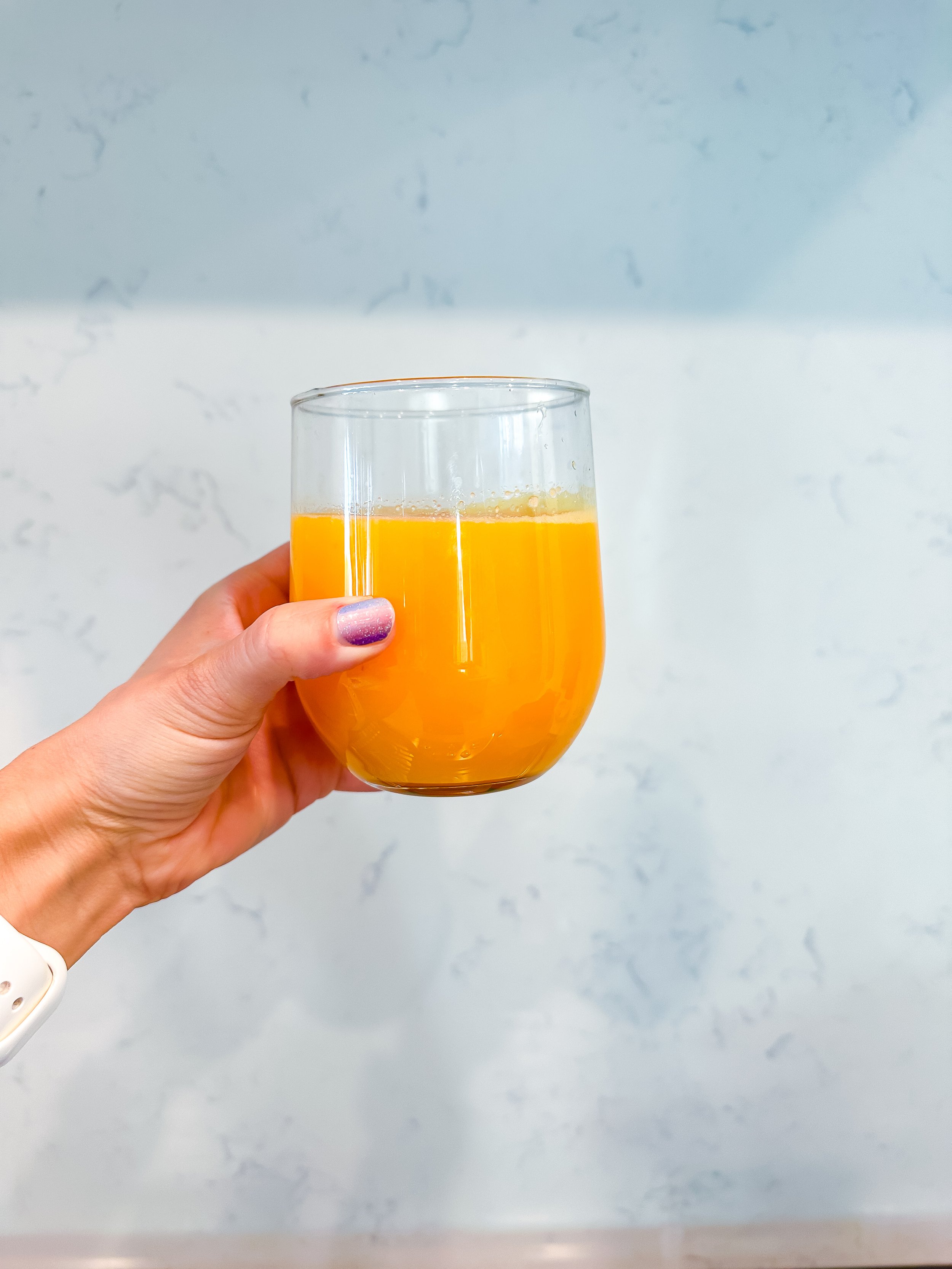How to Make Fresh Homemade Orange Juice
There's nothing quite like the taste of fresh-squeezed orange juice in the morning—its vibrant color, sweet aroma, and burst of citrus flavor make it the perfect start to any day. For me, orange juice isn't just a beverage; it's a nostalgic journey back to my childhood home.
Growing up, my parents had two immense orange trees in our backyard. Every Saturday morning, we would venture out into the yard, carefully selecting the ripest oranges. Bringing them inside, we'd gather around to squeeze fresh, homemade orange juice.
It's a cherished tradition I now continue with my own family, passing down not just a delicious drink, but a piece of my childhood.
Why Make Your Own Fresh Orange Juice?
You might wonder, why go through the effort of making your own juice when you can easily buy it at the grocery store? The answer lies in the taste and health benefits.
Fresh orange juice, made from fresh oranges, is free from preservatives and added sugars, giving you a pure and natural taste that’s hard to beat. Plus, homemade juice retains more of the essential nutrients, boosting your immune system and overall health.
What Are the Best Oranges for Juicing?
Choosing the right type of orange is crucial for the perfect glass of juice. Here are some great options:
Navel Oranges: These are the most popular for juicing due to their sweet flavor and easy-to-peel skin. They are available year-round and produce a sweeter juice.
Valencia Oranges: These oranges are known for their juiciness and are typically used in commercial orange juices. They are a great option if you want to make larger quantities of juice.
Blood Oranges: If you’re looking for a unique flavor and a beautiful, vibrant color, blood oranges are your go-to. They add a slightly tangy taste and are excellent in blended orange juice recipes.
Cara Cara Oranges: These are a type of navel orange with a pinkish-red interior and a sweeter flavor. They are less acidic, making them ideal for those who prefer a milder juice.
Tools You’ll Need
Making fresh squeezed orange juice is pretty straightforward, but having the right tools can make a significant difference in the end result. Here’s what I recommend:
Knife
Cutting Board
Measuring Cup or Pitcher
Jazz’s Tips for Making the Best Orange Juice
Room Temperature Oranges: Before juicing, ensure your oranges are at room temperature. Cold oranges can be harder to juice and may yield less juice.
Roll the Oranges: Roll each orange on the countertop with your palm before cutting. This simple step helps to break down the fibers to get the most juice possible from your oranges..
Pulp Preferences: If you enjoy a bit of pulp in your juice, you can easily customize it. Use a spoon to scoop some pulp from the juicer and add it back into your glass of freshly squeezed juice.
Check out these recipes using orange juice!
How to Make Fresh Homemade Orange Juice
Ingredients:
6 fresh oranges
Instructions:
1. Choose fresh, ripe oranges: Opt for Navel oranges, Valencia oranges, or blood oranges for juicing.
2. Wash the oranges: Rinse each orange thoroughly under cold water to remove any dirt or residue.
3. Prepare the oranges: Using a sharp knife, cut each orange horizontally into halves.
4. Set up your electric citrus juicer: Place the juicer on a stable surface and ensure the juicing cone and pulp container are properly assembled.
5. Juice the oranges: Firmly press one orange half onto the juicer’s reamer (the cone-shaped part). Apply pressure to start the juicer; rotate the orange slightly to maximize juice extraction.
6. Continue juicing: Repeat the process with all orange halves until you have extracted the desired amount of juice.
7. Serve immediately: Pour the fresh orange juice into glasses. For optimal flavor and nutritional benefits, serve immediately after juicing.
How to juice orange juice without an electric juicer!
You can use a manual citrus juicer with the same method! Just make sure your oranges are at room temperature. Roll the oranges to make sure you loosen the juice inside. Alternatively, you can also pop them into the microwave for 10 seconds to loosen to juice!
Nama Juicer
If you love juicing or if you have the Nama Juicer yourself, the Nama Juicer has a citrus juicer attachment that is amazing! You can find the link to the attachment here!
Use code JAZZ10 for 10% off
Read my full Nama Juicer review here!
How to Clean Your Juicer!
Clean your juicer immediately after use to prevent pulp from drying and becoming difficult to remove. Most electric juicers have parts that are dishwasher-safe; check the manufacturer's instructions.
For parts not dishwasher-safe, use a warm, soapy water solution and a soft brush to clean. Rinse thoroughly and dry completely before reassembling.
What to serve with your orange juice!
FAQ
-
- Rich in Vitamin C: Oranges are renowned for their high vitamin C content, which is essential for a strong immune system, helping to protect against infections and illnesses.
- High in Fiber: Orange juice contains natural fiber, which aids digestion and promotes gut health by supporting regular bowel movements.
- Rich in Antioxidants: Antioxidants in orange juice, such as flavonoids and carotenoids, help protect the body from free radicals, reducing oxidative stress and inflammation.
- Great for the Skin: The combination of vitamin C and antioxidants in orange juice helps promote healthy skin by preventing sun damage, improving skin texture, and supporting collagen production.
- Beneficial for the Eyes: Oranges are a good source of both vitamin A and vitamin C, which are important for eye health. They help protect against age-related macular degeneration and maintain overall vision health.
- Very Hydrating: With its high water content, orange juice helps keep the body hydrated, especially important during hot weather or after physical activity.
- Aids Iron Absorption: Vitamin C in orange juice enhances the absorption of non-heme iron (iron from plant-based sources), helping to prevent iron deficiency anemia.
-
The amount of juice you get from a whole orange depends on its size and juiciness. In general, a medium orange will yield about ¼ to ⅓ cup of juice. This means you'll need roughly 6 to 8 medium-sized oranges to make 2 cups of fresh-squeezed orange juice.
-
Freshly squeezed orange juice is best consumed immediately. If you need to store it, keep it in an airtight container in the refrigerator for up to 2-3 days. Make sure to stir well before serving!
-
Don’t throw away those leftover peels! They can be used in various ways:
- Zest: Grate the peel to add zest to desserts or savory dishes.
- Citrus Cleaner: Soak peels in vinegar for a natural cleaning solution.
- Candied Peels: Boil the peels in sugar water to create a sweet treat.
Making your own orange juice is not just a great way to enjoy a delicious and healthy drink, but it’s also a fun and rewarding process. Whether you prefer the tangy kick of blood oranges or the sweet simplicity of navel oranges, there's a perfect citrus out there waiting to be transformed into delicious homemade orange juice.
Feel free to share your own homemade orange juice recipe or your own favorite tips in the comments below!







































